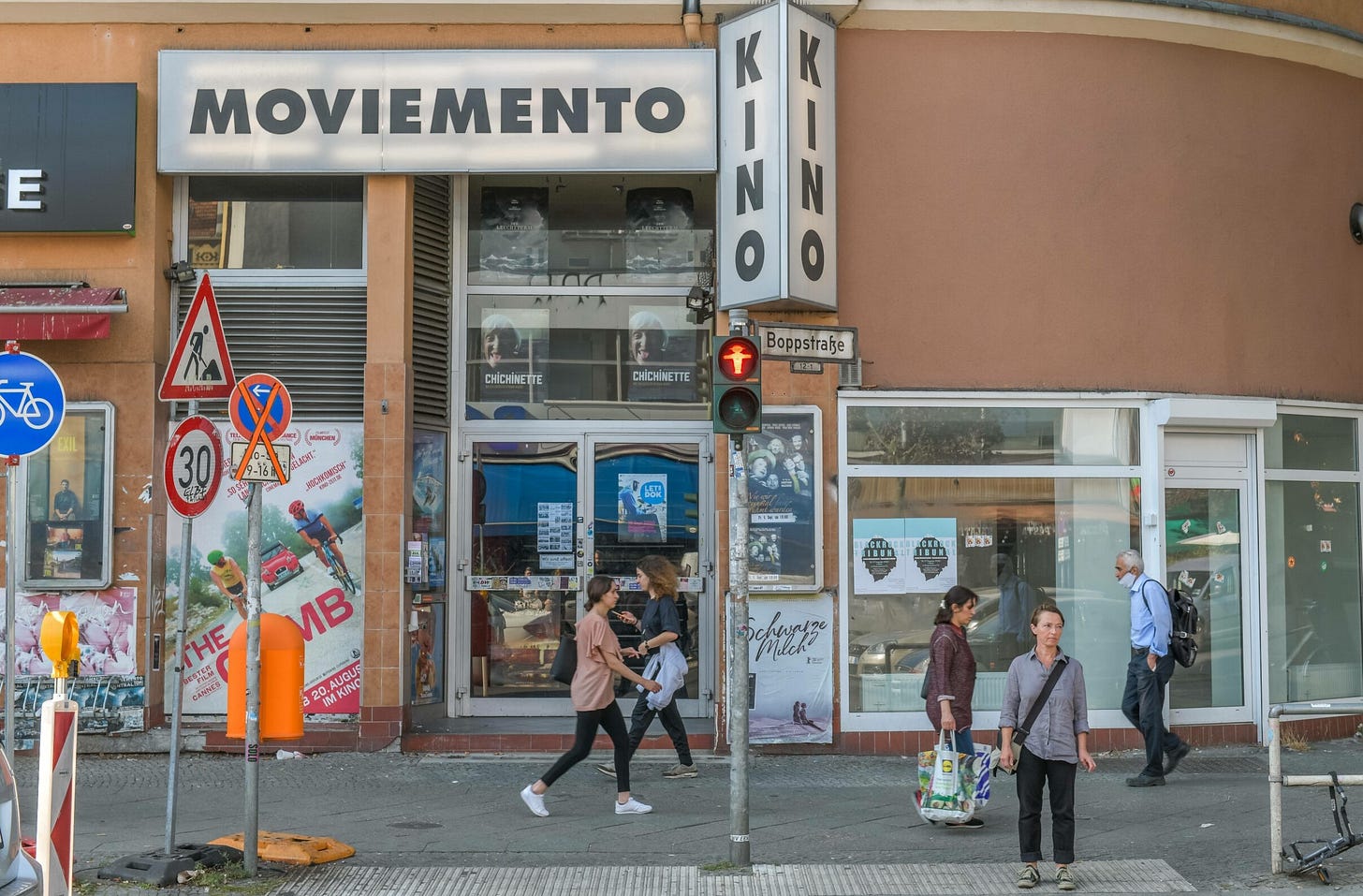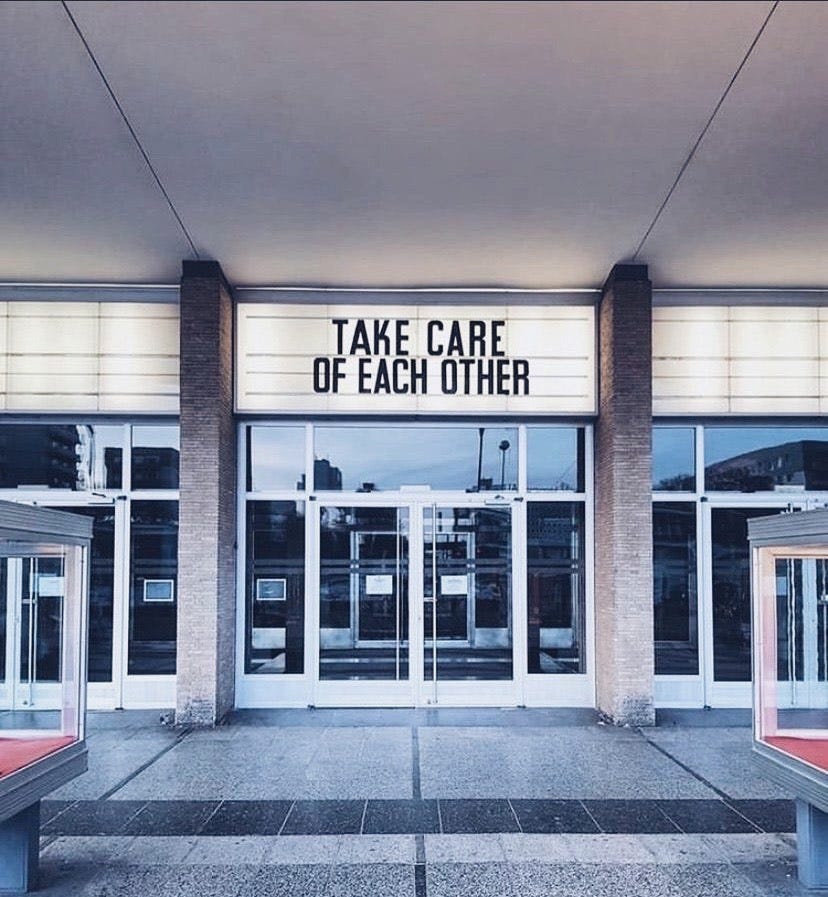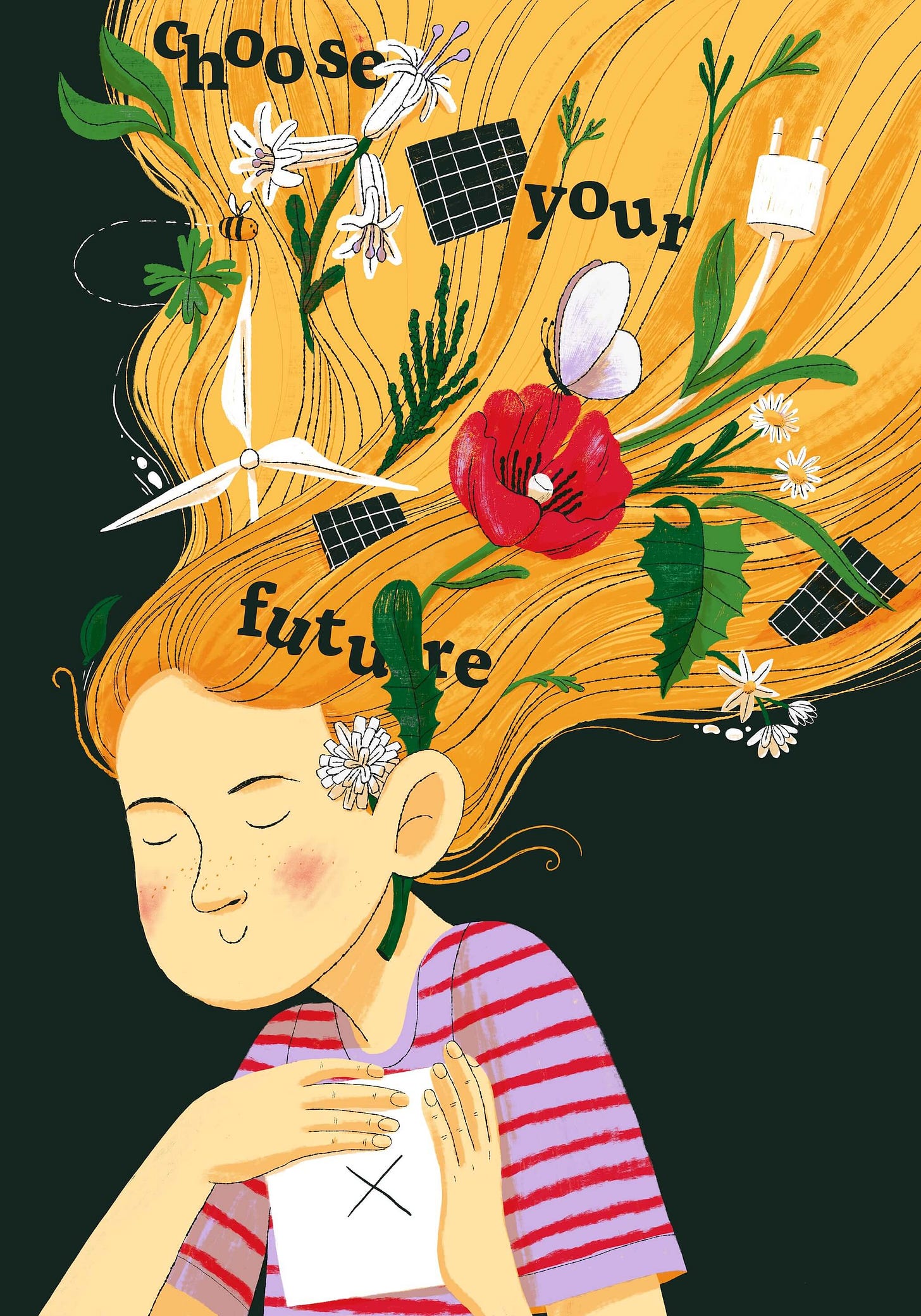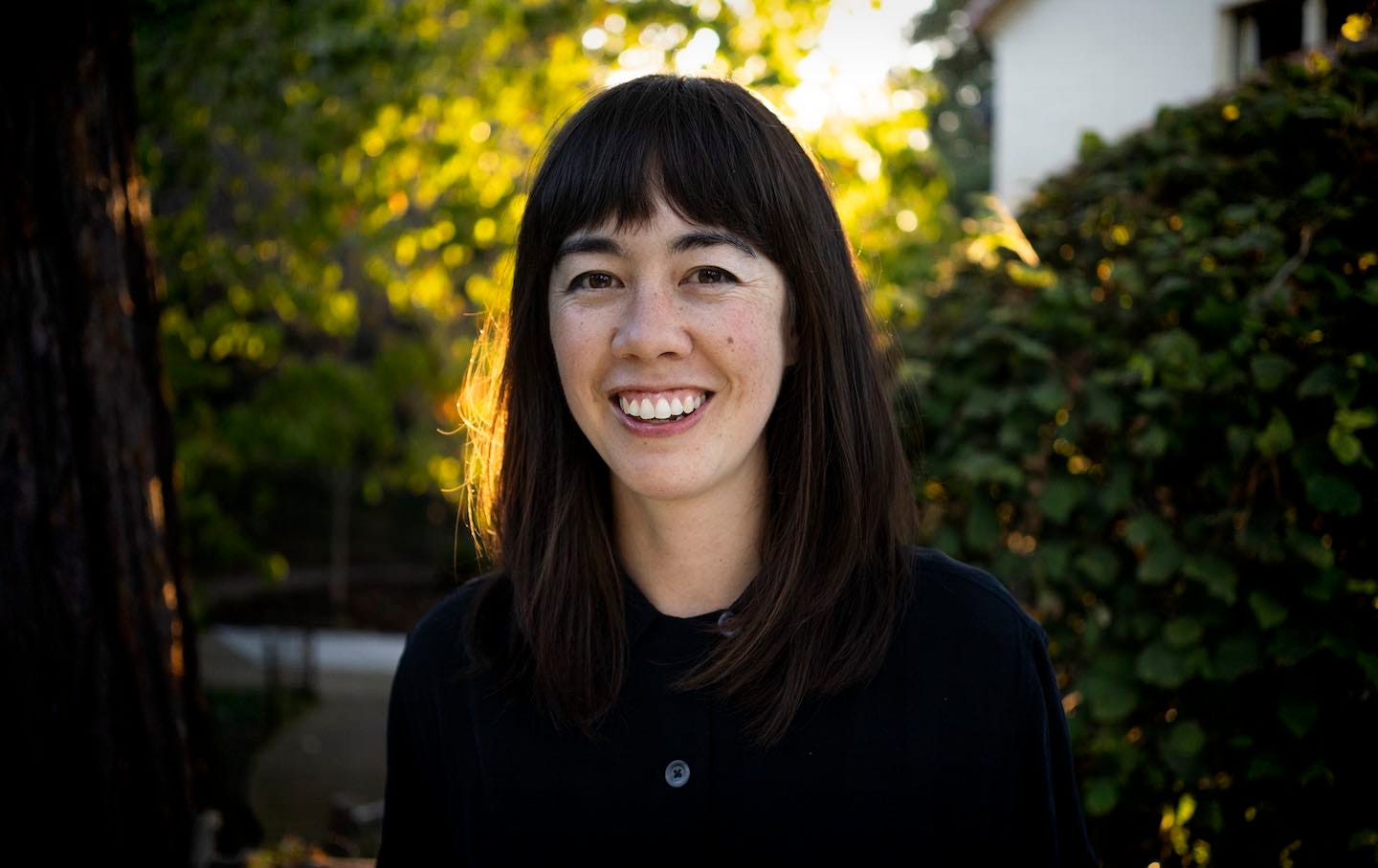The Call to Community
How Berliners saved their oldest cinema, positive initiatives amidst prevailing Euro-pessimism and moving beyond the control of clock time
8 PM. The flickering lights of the projector cast dancing shadows on the worn velvet seats of Moviemento, Germany’s oldest cinema. A hush fell over the audience, a mix of students, artists, and locals, united in their love for film. As I await the start of “Poor Things“ (Emma Stone’s just brilliant, isn’t she?), I sit in this cinematic phoenix that has risen from the ashes of wartime bombings.
“Never doubt that a small group of thoughtful, committed citizens can change the world; indeed, it's the only thing that ever has”.
Cultural anthropologist Margaret Mead’s words resonate through the building – a beacon of Berlin’s cultural landscape. From avant-garde screenings and gritty documentaries to a porn film festival – this is a sanctuary for cinephiles. Founded in 1907, the historic cinema has survived through sheer grit and communal spirit, weathering wartime bombings and the relentless march of gentrification, narrowly escaping demise multiple times.
Yet, Moviemento's story is not just one of survival; it's a tale of defiance, resilience, and voices united. Every time it faced closure, the community fought back. Led by the indomitable duo of Wulf Sörgel and Iris Praefke, they fought tooth and nail to keep its flickering lights burning bright.
Wulf, a veteran of the punk scene, brought with him a spirit of rebellion forged in the crucible of East Berlin. His journey from squatter to cinema savior epitomizes the city's ethos of defiance. Together, he and Iris battled for four years to rescue Moviemento from being swallowed by corporate greed.
In 2007, bankruptcy threatened the cinema, prompting the owner to seek help. Wulf and Iris took over, paying old rents to prevent closure. They revamped the cinema, introducing children's films and events. The renewed cinema officially opened its doors on March 29, 2007, when it celebrated its 100th anniversary, with a screening of the German experimental documentary Berlin - Symphony of the Great City (1927) by director Walter Ruttmann. Attendance soared over the next four years.
However, the building's ownership changed hands multiple times, each rent hike threatening closure. In 2017, the owner began selling apartments and hinted at selling Moviemento. Deutsche Wohnen, the real estate behemoth, eyed Moviemento's prime location hungrily. Pressure from realtors ensued, with offers reaching €2 million, and scandals surfaced.
The threat of closure was very real. Its large area combined with its attractive location on Kottbusser Damm, one of the busiest boulevards in Kreuzberg, as well as a price comparable to that of some luxury apartments in Berlin, make the cinema a potential candidate to be transformed into another bar, restaurant or gym.
Wulf and Iris refused to back down. They mobilized the community, launching a crowdfunding campaign that not only raised funds but also galvanized public support. Their activism extended to engaging politicians and the press, amplifying the voice of the community, and turning the movie house into a symbol of resistance against corporate interests.
The cinema's revival wasn't just a business success. Today, Moviemento's future is secure, by the people and for the people. It stands as a testament to community resilience, and to what “a small group of thoughtful, committed citizens” can achieve.
Long live Moviemento!
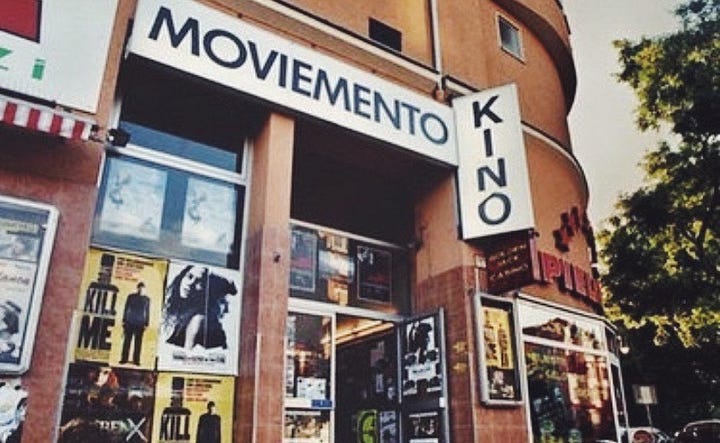
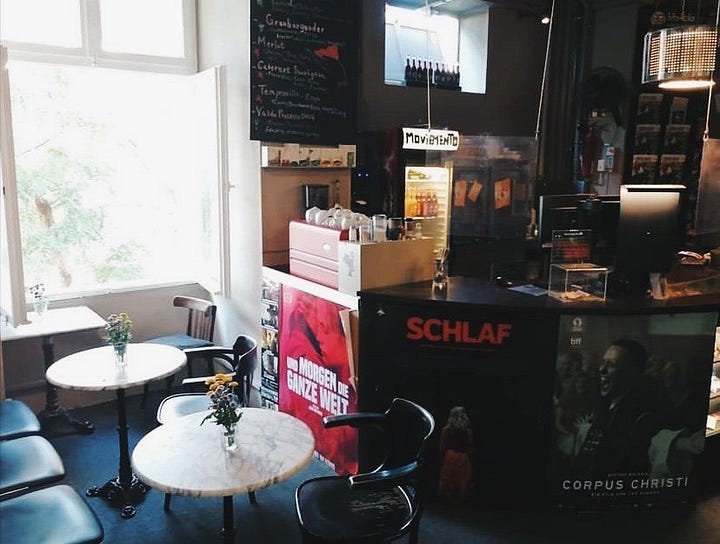
📮European Elections 2024
With the EU Parliamentary elections just weeks away, we're contemplating the future of Europe. Recently, the French President shared a bleak outlook. Given reports of nuclear exercises by Belarus and Russia near Ukraine, and AI's significant impact on the electoral landscape, his skepticism seems warranted.
However, it's not all doom and gloom. Amidst the prevailing Euro-pessimism, several positive initiatives offer hope for Europe's future:
ENTR.en’s series Flipping The Script reimagines traditional political debates by having voters take the stage to discuss important issues, while politicians listen, ask questions, and sit in the audience. This three-part series addresses topics like climate change, migration, and security, emphasizing the voices and concerns of citizens from various European countries.
★ Get Out & Vote Fine Acts has unveiled an incredible series of artworks by 27 artists, each representing a member state of the EU, exploring the theme of democratic engagement. You can download your favorite posters here.
This illustration collection aims to convey a sense of empowerment and agency among citizens – by inspiring hope, optimism, and enthusiasm about the potential impact of voting.
Europe Talks, Europe's largest cross-border dialogue project, aims to bridge the divide between individuals with differing political views to combat polarization. Editor Jochen Wegner recounts surprising outcomes when people engaged in face-to-face conversations, demonstrating how such discussions might encourage a divided world to reconsider its perspectives.
Use your vote. Or others will decide for you. Through its inspiring video campaign, the European Parliament reminds us that the future of Europe depends on the active participation of its citizens.
🪺 Cabinet of Curiosities
𖥧 In Redefining Success So It Doesn’t Crush Your Soul Brad Stulberg explores the notion of success and how it's often misinterpreted in modern society, leading individuals to chase empty goals imposed by external forces. Drawing from ancient Eastern psychology, he introduces the concept of the "hungry ghost," symbolizing insatiable desires driven by consumerism. Brad advocates for redefining success as creating a fulfilling life aligned with personal values and desires, rather than pursuing societal benchmarks like wealth or status:
The survival of a consumerist economy, like the one most of us live in, depends on the creation of hungry ghosts. But you, me—all of us—can choose to opt out of this game. We don’t have to become hungry ghosts.
⸙ Green Dreamer is an alternative multimedia project investigating pathways to collective healing, biocultural revitalization, and genuine abundance and wellness for everyone. Aiming to dismantle the dominant narratives, it offers a space for those who want to delve deeper and confront the complexities of our world. Their newsletter UPROOTED is also worth exploring.
In this episode, Algerian researcher and activist Hamza Hamouchene delves into key narratives about “green energy colonialism. : Why is it essential to focus on the North Africa and Middle East region in climate justice discussions? How does the ongoing global energy transition perpetuate colonial, extractivist power structures? And what does “eco-normalization” mean within the Arab world? By posing critical questions about who truly benefits from renewable energy projects, Hamouchene provides thought-provoking insights that help listeners understand and challenge the systemic injustices of “green colonialism.”
𓆸 Transport yourself to the world of different forests around the world with the tree.fm project. Grounding, soothing, liberating.
༄ Another Kind of Time In this beautiful conversation artist and writer Jenny Odell talks about moving beyond the control of clock time to embrace ways of living that align more closely with the Earth's natural rhythms and patterns.
Emergence Magazine delves into the connections between ecology, culture, and spirituality, aiming to transform perspectives on our relationship with the living world. They present storytelling and art through both traditional and modern mediums, from digital and dynamic formats to physical and intimate ones. By highlighting change, loss, and the possibilities our time holds, Emergence Magazine reveals the interconnectedness and dependency of humans on the living Earth. Or in the editors’ words:
It has always been a radical act to share stories during dark times. They are regenerative spaces of creation and renewal. As we experience a loss of sacred connection to the earth, we share stories that explore the timeless connections between ecology, culture, and spirituality.
💼Opportunities
Reporters sans frontières Social media manager (July 21)
💻Business & Human Rights Resource Centre Communications Officer (June 5)
💻Business & Human Rights Resource Centre Head of Communications (June 9)
💻UN Women Programme/ Project design & management (June 26)
💻Outright International Internship - Communications
AT Forum Alpbach Intern Communications + Volunteers for European Forum Alpbach2024
BE Officer, Women, Peace & Security at NATO (June 2)
BE European Parliament Trainee: Equality Inclusion and Diversity Unit
UK Centre for Global Equality Program Coordinator (May 28)
UK Helen Turner International Development Internship (May 30)
JEF Europe Secretary General (On a rolling basis)
Radio Ambulante seeks pitches [Latin America, US, ongoing basis]
New York Times Newsroom editing residency (May 30)
Ashoka Young African Climate Changemakers Challenge (May 30)
Early Carrer Ocean Professionals program
Creativity Pioneers Fund (May 27)
AFS Global Stem Accelerators Scholarships available (July 1)
REAL DEAL Summit in Budapest June 19 - 21, 2024
Climate Change Media Partnership COP29 Reporting Fellowship (June 6)
Center for Health Journalism Data Journalism Fellowship (July 10)
International Blue Carbon Institute (IBCI) Fellowship (June 15)
Young Professionals in Foreign Policy Fellowship (June 6)
Global Warming Mitigation Project Constellations Fellowship (May 27)
Albert Londres Prize Contest for French-speaking journalists (June 14)
Cassava Republic Press Manuscript prize for Black women writers (June 30)
See you here next month!
Love,
Iva




